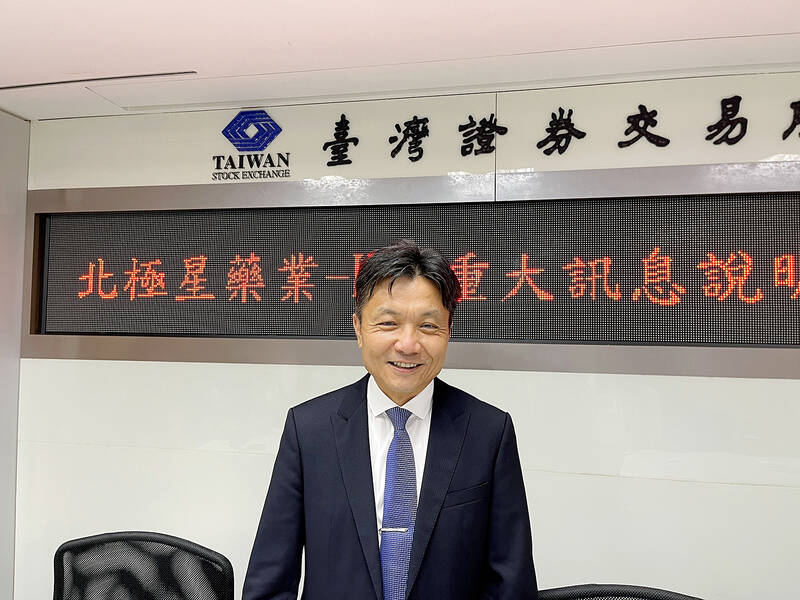Polaris Group (北極星藥業集團) yesterday said that phase 3 clinical trials for its mesothelioma treatment ADI-PEG 20 has been successful, adding that it plans to apply next year for marketing approval with the US Food and Drug Administration (FDA).
The trials showed that two main test gauges reached statistical significance, Polaris said, referring to overall survival (OS) — the time a patient survives from the beginning of treatment — and progression-free survival (PFS) time — the time a patient’s cancer does not worsen from the beginning of treatment.
The median OS time for the 125 participants treated with ADI-PEG 20 was 9.3 months, 21.4 percent higher than 7.66 months for the 124 participants in the control group, Polaris said.

Photo: CNA
The median PFS time was 6.11 months, compared with 5.59 months for the control group, it said.
The trials showed that 98.4 percent and 8.8 percent of all participants in the test group reported adverse events and serious adverse effects respectively, lower than 99.2 percent and 9.7 percent in the control group, it added.
“The small difference between the ratios of people with adverse effects in the two groups signifies the safety of ADI-PEG 20,” it said.
The trials were conducted in 38 hospitals in five countries: Taiwan, the US, the UK, Australia and Italy, it said.
As Polaris in February received the FDA’s fast-track designation, its application for marketing approval would be expedited, Polaris chairman Howard Chen (陳鴻文) told a news conference, adding that the company plans to submit the application at the beginning of next year.
Even though the number of people with mesothelioma is not high, totaling 38,000, the company is confident about the drug’s sales prospects, Chen said.
As Polaris developed ADI-PEG 20 with a metabolism-based strategy that depletes arginine, which causes stress and cytotoxicity in tumors, it could continue to try combining ADI-PEG 20 with other chemotherapy drugs for treating other kinds of cancer, the company said.
Polaris said that cumulative revenue in the first eight months of this year plunged 40 percent year-on-year to NT$5.55 million (US$176,527).

CHIP WAR: Tariffs on Taiwanese chips would prompt companies to move their factories, but not necessarily to the US, unleashing a ‘global cross-sector tariff war’ US President Donald Trump would “shoot himself in the foot” if he follows through on his recent pledge to impose higher tariffs on Taiwanese and other foreign semiconductors entering the US, analysts said. Trump’s plans to raise tariffs on chips manufactured in Taiwan to as high as 100 percent would backfire, macroeconomist Henry Wu (吳嘉隆) said. He would “shoot himself in the foot,” Wu said on Saturday, as such economic measures would lead Taiwanese chip suppliers to pass on additional costs to their US clients and consumers, and ultimately cause another wave of inflation. Trump has claimed that Taiwan took up to

A start-up in Mexico is trying to help get a handle on one coastal city’s plastic waste problem by converting it into gasoline, diesel and other fuels. With less than 10 percent of the world’s plastics being recycled, Petgas’ idea is that rather than letting discarded plastic become waste, it can become productive again as fuel. Petgas developed a machine in the port city of Boca del Rio that uses pyrolysis, a thermodynamic process that heats plastics in the absence of oxygen, breaking it down to produce gasoline, diesel, kerosene, paraffin and coke. Petgas chief technology officer Carlos Parraguirre Diaz said that in

Japan intends to closely monitor the impact on its currency of US President Donald Trump’s new tariffs and is worried about the international fallout from the trade imposts, Japanese Minister of Finance Katsunobu Kato said. “We need to carefully see how the exchange rate and other factors will be affected and what form US monetary policy will take in the future,” Kato said yesterday in an interview with Fuji Television. Japan is very concerned about how the tariffs might impact the global economy, he added. Kato spoke as nations and firms brace for potential repercussions after Trump unleashed the first salvo of

SUPPORT: The government said it would help firms deal with supply disruptions, after Trump signed orders imposing tariffs of 25 percent on imports from Canada and Mexico The government pledged to help companies with operations in Mexico, such as iPhone assembler Hon Hai Precision Industry Co (鴻海精密), also known as Foxconn Technology Group (富士康科技集團), shift production lines and investment if needed to deal with higher US tariffs. The Ministry of Economic Affairs yesterday announced measures to help local firms cope with the US tariff increases on Canada, Mexico, China and other potential areas. The ministry said that it would establish an investment and trade service center in the US to help Taiwanese firms assess the investment environment in different US states, plan supply chain relocation strategies and